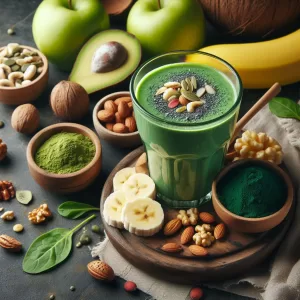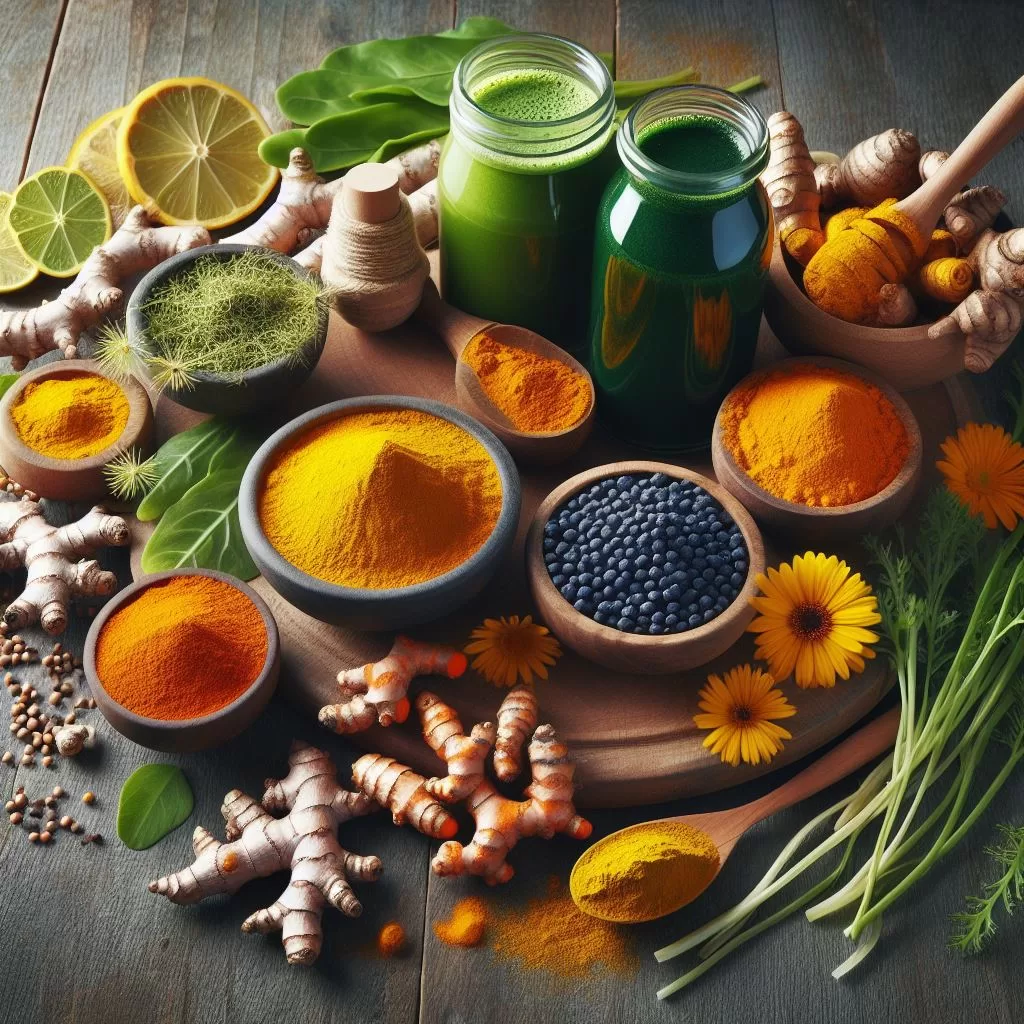In a world where our exposure to toxins is inevitable, turning to nature to cleanse our bodies has never been more relevant. Superfoods, rich in nutrients and detoxifying properties offer a promising avenue to support the vital functions of our body and promote the elimination of harmful substances. Among them, Milk Thistle, Turmeric, Dandelion, Spirulina, and Coriander stand out for their remarkable health benefits.
This article explores how these powerful natural allies can help us purify our bodies of heavy metals and other toxins while supporting our liver, digestive, and immune systems.
1. Milk Thistle (Silybum marianum):

Milk thistle (Silybum marianum), known for its hepatoprotective properties, is an essential medicinal plant in the field of herbal medicine to treat various liver conditions. Its main active substance, silymarin, is a complex of flavonolignans (including silybin, silydianin, and silychristin) that contributes to the stabilization of hepatocyte cell membranes, inhibits lipid peroxidation, increases the absorption of free radicals, and supports the mechanism of hepatic detoxification through the regulation of the glutathione pool. This complex action helps reduce damage to liver cells caused by various toxins such as alcohol, certain medications, and environmental toxins.
Since Antiquity, people have used milk thistle for its benefits on the liver and bile ducts. Traditionally, it is also known to improve depressive states and promote lactation. Silymarin acts by two main mechanisms: it protects the liver by stabilizing the cell membranes of hepatocytes and by stimulating the activity of polymerase A, which promotes liver regeneration. This therapeutic action makes Milk
Thistle is particularly effective in preventing and treating functional liver disorders, hepatitis, jaundice, cirrhosis, as well as liver damage due to the ingestion of toxins.
However, it is crucial to consult a healthcare professional before starting treatment, particularly due to potential side effects such as gastrointestinal or skin reactions and interactions with other medications.
In terms of use, Milk Thistle can be consumed in several forms: in herbal tea, in powder, in capsules, or hydro-alcoholic extract (mother tincture), with specific dosages recommended for each form. Preparation and dosage depend on the therapeutic goal, whether for preventative use or the treatment of acute or chronic liver conditions.
In summary, Milk Thistle is a valuable medicinal plant for liver health thanks to its protective and regenerative properties. Its use is part of a long tradition of herbal medicine, supported by modern research which confirms its benefits. However, a cautious and informed approach is necessary, taking into account precautions for use and advice from a healthcare professional.
2. Turmeric (Curcuma longa):

Additionally, turmeric plays a protective role in the liver, helping prevent and treat conditions such as fatty liver disease. Research has also explored its use in the management of cirrhosis, indicating that turmeric may limit its progression through its liver-protective properties. A notable clinical trial found that daily consumption of 3 g of turmeric powder for 12 weeks resulted in a significant decrease in markers of liver disease, including ALT, AST, and GGT, without negatively affecting the profile. lipid or serum bilirubin level.
Turmeric also has potential benefits for brain health, particularly for managing symptoms of dementia and Alzheimer’s disease. Some studies suggest that turmeric may play a role in reducing the buildup of amyloid plaques in the brain, a contributing factor to Alzheimer’s. Additionally, turmeric has been linked to improved management of asthma, colonic ulcers, diabetes, hypertension, stomach ulcers caused by H. pylori, indigestion, and various infections.
It is important to note that, although turmeric offers many potential health benefits, individuals should approach its consumption with caution, particularly regarding possible drug interactions, such as with diabetes medications or blood thinners. As always, it is recommended to consult with a healthcare professional before incorporating turmeric or curcumin into your supplement regimen, especially if you are already taking other medications.
This information highlights the versatility of turmeric as a natural supplement to support various aspects of health while emphasizing the importance of responsible and informed use of this powerful spice.
3. Dandelion (Taraxacum officinale):

Dandelion is best known for its diuretic properties. It promotes urinary elimination, thus helping to purify the body of toxins and preventing kidney disorders. This diuretic action is due to its richness in potassium, which gives dandelion an advantage over other diuretics which can cause potassium loss. In addition, the plant acts as a cholagogue and choleretic, stimulating biliary and hepatic functions, making it an ally for people suffering from minor digestive disorders and dyspepsia.
Research suggests that dandelion may increase liver activity while protecting it through its antioxidant properties. This makes it a potential tool to protect an ailing liver, for example, in cases of high ALT levels, indicating liver distress.
In summary, dandelion provides a multitude of health benefits, including promoting diuresis, supporting liver and biliary functions, and acting as a powerful antioxidant.
However, as with any herbal treatment, it is advisable to consult a healthcare professional before starting treatment, especially in the presence of specific medical conditions or concomitant use of other medications.
4. Spirulina (Arthrospira platensis):

Spirulina (Arthrospira platensis), a microscopic cyanobacteria, is known for its exceptional nutritional profile and numerous health benefits. Its richness in proteins, vitamins, minerals, and antioxidants makes it a particularly popular superfood for its detoxifying properties and its support for the immune system.
– Richness in Nutrients: A tablespoon of spirulina provides a significant amount of protein, iron, copper, and B vitamins, with notable contributions of omega-3 and omega-6, essential for the proper functioning of the body.
– Muscle Support: Athletes particularly appreciate Spirulina for its ability to help strengthen muscle mass, thanks to its high content of proteins and essential amino acids.
– Detoxifying Properties: Spirulina has demonstrated its ability to bind heavy metals, facilitating their elimination from the body. This property makes it a valuable ally in detoxifying cures.
– Brain Protection and Memory Improvement: Preliminary studies in animal models have shown that spirulina could offer protection against neurodegenerative diseases such as Parkinson’s disease and help prevent memory loss.
To benefit from its effects, the recommended consumption varies from 1 to 8 grams per day.
In short, spirulina is a superfood with multiple health benefits, provided you respect the recommended dosages and choose high-quality products.
5. Coriander (Coriandrum sativum):

Coriander (Coriandrum sativum) is recognized for its chelating properties of heavy metals, thus facilitating their elimination from the body. Research has shown that consuming cilantro can significantly increase the urinary excretion of metals like mercury, aluminum, and lead, thanks to its biochemical compounds capable of separating these metals from body tissues.
An interesting study found that using filters made from crushed coriander could effectively absorb heavy metals such as lead and nickel, making water cleaner for drinking. This simple and economical method could prove particularly useful in regions where these metals contaminate water.
In addition, an experiment on mice exposed to lead demonstrated that the administration of coriander significantly reduced lead deposits in their kidneys and femurs. Cilantro, combined with chlorella, seems to increase the effectiveness of chelating heavy metals, thus facilitating their elimination. Clinical studies have found that this combination can naturally reduce lead, mercury, and aluminum levels in the body significantly in just over a month.
In summary, coriander, thanks to its antioxidant properties and its ability to chelate heavy metals, can be an excellent complement to detoxification protocols. However, it is crucial to consult a healthcare professional before undertaking such a treatment, particularly if you have specific health conditions or are under medication.
Conclusion:
The integration of Milk Thistle, Turmeric, Dandelion, Spirulina, and Coriander into our diet represents an effective strategy to strengthen our general well-being and promote detoxification. These superfoods, derived from ancient wisdom and validated by contemporary scientific studies, offer a natural and gentle approach to maintaining the balance and health of our bodies.
However, one should remember to consult with a health professional before starting any detoxification treatment to ensure a suitable and safe approach. By honoring the gifts of nature and adopting a mindful diet, we can effectively support our body in its purification and healing process.

